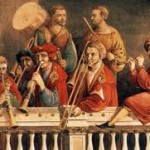2.4- Music During the Northern Renaissance
Rise in Secular Music
- Secular – No association with religious meaning or ceremonies
- Lyrics in the vernacular
The Madrigal
[audio:MusicandMadrigals.mp3]- A vocal composition for a small group of singers
- Usually a capella
- Usually polyphonic
- Appealed to education, courtly audiences
- Topics of love, and frivolity
- Witty settings of text
- Word painting
- Madrigals flourished in England
Important Madrigal Composers in England
Thomas Weelkes
As Vesta Was Descending
https://www.mhhe.com/socscience/music/kamien/student/olc/43.htm
Hark All Ye Lovely Saints
httpv://www.youtube.com/watch?v=2cD0X5-GE5s
Thomas Morely
Now is the Month of Maying
httpv://www.youtube.com/watch?v=B8NBtPxeR1E&feature=related
Philis, I Fain Would Die Now
Click here to view.
John Dowland
A historical video (dated but still good) about the madrigal:
A Fine Knack for Ladies
httpv://www.youtube.com/watch?v=KGX1XQaLQ0M&feature=related
Musical Instruments
Musical instruments have evolved substantially since the Renaissance. Take a quick tour of some of the instruments that were used during this era.
https://www.music.iastate.edu/antiqua/instrumt.html

 |
|
No. 1 — October 11th, 2009 at 2:57 pm
Secular music called magical was aimed toward people with class.
No. 2 — March 6th, 2010 at 11:57 pm
I love the website with the information about and examples of all of the instruments. Wow!
No. 3 — July 15th, 2010 at 2:00 am
My favorite instrument is the recorder
No. 4 — September 17th, 2010 at 3:52 am
WOW, Interesting how many of those instruments sound like some of our modern instruments. I personally liked the sound of the gemshorn; very mellow and smooth sounding. I thought the Hurdy-Gurdy had a unique sound that I had never really heard before, plus it has a great name. 🙂
No. 5 — February 13th, 2012 at 6:18 pm
A Lute, in the hands of a skilled player, is the most epic of all Renaissance instruments.
No. 6 — September 18th, 2012 at 7:47 pm
I enjoy the musical skill both in voice, music, and composition reflected in this music.